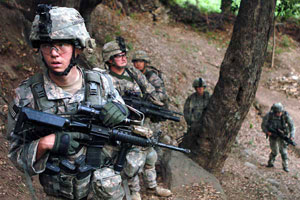(lead article)
U.S. general sets ‘new’
plan for Afghan war
Lays ground for continued escalation

|
|
U.S. Army/Sgt. Matthew Moeller
|
|
U.S. army soldiers patrol Korengal valley in Afghanistan’s Kunar Province August 13. There are 62,000 U.S. troops in Afghanistan, up from 38,000 at the start of the year.
|
BY SETH GALINSKY
A strategic review of the U.S. military’s conduct of the war in Afghanistan paves the way to send more troops. Washington has been increasing its forces in Afghanistan since President Barack Obama took office in January.
Gen. Stanley McChrystal, commander of U.S. and NATO forces in Afghanistan, turned in the report August 31. He said that the situation is “serious, but success is achievable.” Although McChrystal’s report will not be made public, military officials described its contents to selected news media.
The report argues for shifting U.S. strategy to emphasize the importance of holding and securing areas captured from Taliban control. The strategy is a version of that applied in Iraq, which required an additional 30,000 troops, dubbed the “surge.” It also calls for a large expansion of the Afghan army and police. There are currently about 134,000 Afghan cops and 82,000 soldiers.
The number of U.S. troops in Afghanistan has climbed steadily from 38,000 at the start of the year to 62,000 today. By the end of December there will be 68,000, including 4,000 sent to train Afghan forces. Some 34,000 NATO troops, mostly from Britain, Canada, France, and Germany, are also stationed in the country.
Worried about its inability to defeat Taliban groups, the U.S. military has begun shifting how it conducts the war. It is redeploying troops from the countryside to more heavily populated areas, like Kandahar, the largest city in southern Afghanistan, as part of a “clear, hold, and build” strategy.
Afghanistan, with more than 33 million people in an area about the size of Texas, is one of the most underdeveloped regions in the world. It has the fourth highest birthrate and the third highest infant mortality rate in the world.
On August 26 McChrystal issued a “Counterinsurgency Guidance” for U.S. and NATO troops in Afghanistan to win the war by “persuading the population.” He refers to U.S. imperialism’s occupation of Afghanistan euphemistically as “nearly eight years of international presence.”
Taliban groups, he says, “influence the population through both intimidation and attraction.” The U.S.-led forces need to change “our mindset,” McChrystal’s directive says.
The guidelines call on U.S. soldiers to “embrace the people” and “build governance capacity.” They encourage the U.S. forces to turn in “corrupt” officials to the Afghan government so they can be replaced by “honest, hard-working” leaders.
The U.S. military has sent more spy planes to Afghanistan and moved others there from Iraq, while increasing their overall number. In July 2008, 75 percent of U.S. spy planes, including drones, operated in Iraq and 25 percent in Afghanistan. By August this year 66 percent were in Afghanistan and 33 percent in Iraq.
Increased U.S. military activity has meant higher casualties. Two bombings on August 31 brought the number of U.S. troops killed for the month to 47, the highest monthly U.S. death toll since Washington invaded the country in 2001.
According to the United Nations, 1,013 civilians were killed in the first half of 2009, an increase of 24 percent from last year and almost double the 2007 figures. The UN blamed Taliban groups for 60 percent of those deaths and the U.S.-led coalition forces for about 30 percent.
Indiscriminate U.S. bombings have sparked outrage in Afghanistan, including among Taliban opponents. On July 2 McChrystal ordered U.S. and NATO commanders to restrict artillery and air strikes to avoid hitting civilians. As a result of the new policy, Washington says there were 19 civilians killed by coalition actions from July through August, down from 151 in the same period last year.
The escalation of the imperialist war in Afghanistan has left some liberal antiwar groups feeling betrayed by the Obama administration. United for Peace and Justice, which celebrated Obama’s election, is now calling for local protests and teach-ins in October against the war.
Cindy Sheehan, the mother of a U.S. soldier who died in Iraq, led protests against the war during the George W. Bush administration. At a news conference August 27 at Martha’s Vineyard, where Obama was vacationing, she said, “Even though the facade has changed in Washington, D.C., the policies are still the same.”
Conservative George Will wrote in a September 1 column that U.S. forces should be reduced because the number of troops and time needed for a counterinsurgency that could win is “inconceivable.”
“Instead,” he said, “America should do only what can be done from offshore, using intelligence, drones, cruise missiles, airstrikes and small potent Special Forces units, concentrating on the porous 1,500-mile border with Pakistan, a nation that actually matters.”
However, William Kristol, editor of the conservative Weekly Standard, wrote August 31 that “a majority of conservatives don’t merely support the war but say they approve of President Obama’s handling of it.”
Related articles:
New Zealand troops are deployed to Afghanistan
‘Contractors’ critical to U.S. wars around world
| 


